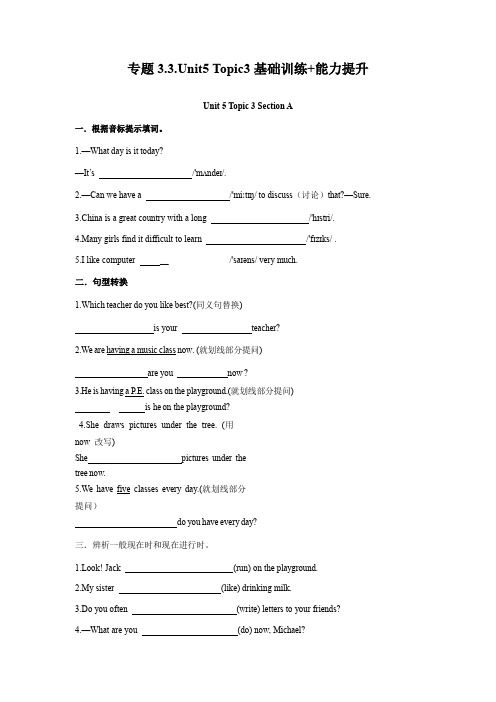最新科普(仁爱)版英语七年级下册Unit5 Topic3 SectionA【市级优质课教案】【全英式教案】
Unit 5 Topic 3 Section C 课件 2022-2023学年仁爱版七年级英语下册

Read the news and posters again, and then fill in the blanks.
A Soccer Game
Place: on the playground Day: this afternoon Time: at 5:00 Program: A Soccer Game
Stamp Show
Place: in the school hall Day: every Saturday Time: 9:00 a.m.-5:00 p.m. Program: Stamp Show
Read the news and posters again, and then fill in the blanks.
More activities
Read and answer the following questions.
1) When does the soccer game begin? At 5:00 this afternoon.
2) Where can we see the Stamp Show? In the school hall.
He doesn't like math, because it's a little _d_if_f_ic_u_l_t_ and _b_o_r_i_n_g_.
dislike
reason
Careful reading Read para.3 and fill in the blanks. the main idea of para.3: _h__is_a_c_t_i_v_it_ie_s_a_f_t_e_r_c_la_s_s
Unit3Topic3SectionA教案(大全五篇)[修改版]
![Unit3Topic3SectionA教案(大全五篇)[修改版]](https://img.taocdn.com/s3/m/c63e3c2676a20029bc642db6.png)
第一篇:Unit 3 Topic 3 Section A 教案黑龙江省哈尔滨五常市私立万宝中学校英语课程改革(七年级上)教师专用教案(Unit 3)Topic 3What would you like to drink?Section A (2课时)第1课时1. Help yourselves! 译为:请随便吃/喝!该句为主人招待客人用餐时的常用语。
如果被招待者是一个人,用help yourself; 若是两人或两人以上,用“Help yourselves.”另外help yourself to…译为“请随便吃/喝些……”▲【例句】请随便吃些苹果。
Help yourself to some apples. 我可以喝杯饮料吗?Can I have a drink, please? 请自用。
Help yourself.★【拓展】如果主人要请客人吃什么东西,则用Help yourself/yourselves to sth. ▲【例句】汤姆,请随便吃些橘子。
Help yourself/yourselves to some oranges, Tom.孩子们,请随便吃些苹果。
Help yourselves to some apples, boys. 2. I would like an egg and some fish. 译为:我想一个鸡蛋和一些鱼肉。
(1) would like 译为:要,想要,愿意,喜欢,希望。
would like 要用于婉转地提出请求、建议或某种看法,在意思上相当于want,但语气比want更委婉。
would like后面可以跟名词或代词,如果跟动词,一般是不定式形式(to do sth.)。
would like 在口语常说成’d like,不受主语人称和数的变化影响。
▲【例句】①我想要一个鸡蛋。
I’d like an egg. = I want an egg.②他想要喝果汁。
He would like to drink juice. = He wants to drink juice. (2) would like 的一般疑问句形式为: Would +主语+like…? Would you like…译为:“你想要……吗”用于礼貌地提出建议或发出邀请,有时含有请求的意味。
Unit5 Topic3 SectionD-七年级英语下册课件(仁爱版)

闯关练习: She is a great woman . You can ___D__ a lot _____ her. A. speak; with B. learn; about C. learn; with D. learn; from
Key points
back
2. Thank you for your hard work! 谢谢你的努力工作!
Learning aims:
I、复习一般现在时态和现在进行时态。 II、掌握英语书信的写法。 III、能用英语描述自己的学校生活。
Review 根据图片和所给信息填空(包括活动和地点)。
Tom and Bob _a_r_e_p_l_ay_i_n_g_ soccer ____in__th_e__g_y_m______.
Read through Sections A — C. Pay attention to the underlined part of each sentence and fill in the blanks with the correct words.
Present Simple
I often speak English with my classmates. He usually plays soccer, but he doesn’t play basketball.
Warm up Which subject do they have on Monday/...?
New words &expressions
/hɑ:d/ adj. 努力的;困难的;硬的
Thank you for your hard work.
These bees work hard every February.
仁爱版七年级下册英语课件Unit5Topic3SectionD共31张PPT

go to the zoo /watch animals
have a biology class
Place playground
library zoo lab
Read the letter and answer the following questions.
Dear sir,
February 28th
Thank you for your hard work! Best wishes
Li Mei
Answer the following questions.
1.What does Li Mei do? S_h_e__is__a_s_tu_d_e_n_t_. _
2.What's in the school newspaper? _It_h_a_s__S_c_h_o_o_l _N_e_w_s_,_M__u_s_ic_,__________ _S_c_ie_n_c_e_T_o_d_a_y__a_n_d_s_o__o_n_. ____
3.Why does she like Science Today best? _S_h_e_c_a_n_l_e_a_rn__a_l_o_t_f_ro_m__i_t.____
4.How does Li Mei like the school newspaper? S__h_e_li_k_e_s_s_c_h_o_o_l_n_e_w_s_p_a_p_e_r_v_e_ry__m__u_ch_.__
Listen to the conversations and complete the table.
Name
Activity
have a P.E. class Kangkang Wednesday
最新仁爱科普版初中七年级英语下册Unit 5 Topic 3 Section C课件

We learn: 1. some words: study, activity, attention, stamp, between, Saturday, night, sound
2. some phrases: from … to…, Stamp Show 3. some sentences:
Suppose there will be a concert in the school hall from 7:00 p.m. to 9:00 p.m. on Friday evening. Please write a piece of news, and then make a poster.
* What day is it today? * Which subject do
you like best? * Why do you like it? * What do you think of it? * What time does the
class begin?
* It's ... * I like ... best.
4. Swimming is his favorite outdoor activity. True False
1a. Read and understand.
P21 1a 5幅图
1b. Read 1a again and fill in the blanks.
Hu Bin is a student of Class 1, Grade 7. His school life is very _i_n_te_r_e_st_in_g_. Classes __b_eg_i_n__ at 8:00 a.m. He __st_u_d_ie_s_ Chinese, English, politics and some other subjects. He __li_k_e_s_ English best. But he __d_o_e_sn_’_t_ _li_k_e__ math. He _t_h_in_k_s_ it’s a little difficult and boring. After school, he often _p_l_ay_s_ basketball with his classmates. It’s his favorite outdoor activity.
仁爱英语七年级Unit 5 Topic 3 基础训练+能力提升(解析版)

专题3.3.Unit5 Topic3基础训练+能力提升Unit 5 Topic 3 Section A一.根据音标提示填词。
1.—What day is it today?—It’s /'mʌndeɪ/.2.—Can we have a /'miːtɪŋ/ to discuss(讨论)that?—Sure.3.China is a great country with a long /'hɪstri/.4.Many girls find it difficult to learn /'fɪzɪks/ .5.I like computer __ _____________ /'saɪəns/ very much.二.句型转换1.Which teacher do you like best?(同义句替换)is your teacher?2.We are having a music class now. (就划线部分提问)are you now ?3.He is having a P.E. class on the playground.(就划线部分提问)is he on the playground?4.She draws pictures under the tree. (用now 改写)She pictures under thetree now.5.We have five classes every day.(就划线部分提问)do you have every day?三.辨析一般现在时和现在进行时。
1.Look! Jack (run) on the playground.2.My sister (like) drinking milk.3.Do you often (write) letters to your friends?4.—What are you (do) now, Michael?—I (clean) the room.5.Linda often (have) breakfast at 8:00 in the morning.【答案】一1. Monday;2. meeting; 3. history; 4. physics; 5. science句型转换二1. Who; favorite2.What; doing3.What class; having4. is drawing5.How many classes三1.is running; 2. likes; 3. write; 4.doing; am cleaning 5. hasUnit 5 Topic 3 Section B一.根据音标提示填词1.I think history is very /'ɪntrəstɪŋ/. Many students in my class like it.2.It’s /'i:zi/ to get the virus(病毒)if you don’t wear amask(口罩).3.—Which /'sʌbdʒɪkt/ do you like best?—I like politics best.4./wɪtʃ/ dress do you like better, the blue one or the red one?5. Jimmy has a poor handwriting, so it’s /'dɪfɪkəlt/ to read.二.句型转换根据要求变换句型,每空填一词。
七年级英语下册Unit5OurschoollifeTopic3MyschoollifeisveryinterestingSectionB教案(新版)仁爱版
Unit 5 Our School LifeTopic 3 My school life is very interesting.Section B一、教学目标1. 能根据已学语音、音标及发音规则,正确朗读下列词汇并在实际的对话操练中加以应用:easy, interesting, difficult, learn, which, subject, best2. 能够就“最喜欢的科目、喜好的原因”等话题进行交流与对话操练,如:(1)—What do you think of it?—I don’t like it. It’s a little difficult.(2) I like history very much because it’s very interesting.(3) —Which subject do you like best?—I like history best.—Why do you like it?—Because it’s easy and interesting.3. 能通过谈论最喜爱的课程及其原因,增进同学之间的了解,培养学生对校园生活的热爱之情。
二、教学重点及难点能在情景对话中,掌握对某一科目看法的表达法,谈论最喜欢的科目并陈述原因。
三、教学准备教师:教学课件;多媒体设备学生:课前预习四、教学过程Step 1 RevisionAsk Ss to discuss their timetable with their partners.e.g.A: How many lessons do you have every weekday?B: Six. I have four classes in the morning and two classes in the afternoon. I can play sports after class in the afternoon.A: How many English lessons do you have every day?B: Two. English is my favorite subject....【设计意图】复习上节课所讲内容。
仁爱版七年英语下册Unit5 Topic3 Section B教案
课题Unit5 Topic3S e c t i o n B备课时间 3.11 授课时间 3.17教学目标知识与技能能够在情景对话中谈论对某一科目看法,谈论最喜欢的科目并陈述原因;过程与方法能听懂谈论最喜爱的课程及其评价的简单对话;能表达自己最喜爱的科目并陈述原因情感态度价值观能通过谈论最喜爱的课程及其原因,增进同学之间的了解,培养学生对校园生活的热爱之情教学重点能在情景对话中,掌握对某一科目看法的表达法,谈论最喜欢的科目并陈述原因。
教学难点能够就“最喜欢的科目、喜好的原因”等话题进行交流与对话操练教学方法Co-operation学习方法Task-based课型Speaking教学过程Step InteractionpatternStudent activity Teacher activityIntroduction (5 minutes) 1.The wholeclass work.2.Group work.1.Focus their attentionon the teacher.2.Have a groupcompetition. Sit ingroups. Answer theteacher’s questions asquickly as you can.Revise the words aboutthe days of a week andsubjects. The groupwhich can answer themost questions will bethe winner in this1. Get students readyfor learning.2.Help the studentsto revise the wordsabout the days of aweek and subjects.Organize thecompetition to arousethe students’interests.competition.Presentation (10 minutes) 1.Individualwork and pairwork.2.The wholeclass workand individualwork.1.Look at the wordflashcards (easy,interesting, difficult).Answer the teacher’squestions and learn thenew words and newsentence patterns.2. Do 1a. Look at thepicture in 1a. Predict thelistening material in 1a.Then listen to the tapeand complete the twocolumns in the table in1b. Then listen again andcomplete the thirdcolumn in 1b. Check theanswers with yourpartner. Then t he wholeclass check the answerstogether.1. Present new wordsand new patternswith the help of theflashcards andcontext.2.Help the studentslearn to ask someone,likes or dislikes of asubject. Tell them tolisten to key wordswhile listening.Consolidation (10 minutes) 1.The wholeclass work andpair work.2.Individual1.Read 1a after the tape.Then practice theconversation in 1a inpairs.Some pairs read out theconversation to the wholeclass.2.Do 1b. Look at the1.To be a goodlistener.2.Help the students towork. table in 1b. Try to say thesentences with the helpof the table.. organize the sentences with the help of the table. Consolidate the sentence patterns about likes and dislikes.Practice(10 minutes)1.Pair work.2.The wholeclass work andpair work.3.The wholeclass work and 1.Do 1a. After practicingt he conversation in1a,m ake up a newconversation about yourfavorite subject in pairs.Then practice your newconversation with yourpartner. After that, somepairs act out yourconversations to thewhole class.2.Do 2a. Answer theteacher’s questions tolearn the new phrase—learn about.Then match the words ofsu bjects with thedescriptions individually.Check the answers wit hyour partner.3.Do 2b. Answer theteacher’s questions to1.Make the studentspractice expressionsabout likes anddislikes orally.2.Create situations topresent the newphrase. Check theanswers. M ake thestudents practice thewords of subjectsorally.3.Make the studentspractice thepair work. learn new words—which, subject, best. expressions about likes and dislikes.Production (10 minutes) 1.Group work. 1.Do 3. Sit in groups.Survey your groupmembers about thesubjec ts they like ordislike and the reasons.Then report the result tothe class1.Make the studentsuse the expressionsabout likes anddislikes in oralwork and writtenwork after learning.作业布置Review the words and practice the conversations in 1a with your partner;Go on writing your survey report. Then report it to the class the nextday;Preview Section C.课前二次备课梳理课后反思。
仁爱版七年级英语下册课件3AUnit5 Our School Life Topic3 SectionD 课件 (共15张PPT)
are interesting. Science Today is my favorite. I can learn a
lot from it. I think our school newspaper is wonderful. Thank you for your hard work! Yours, Li Mei
3. Why does she like Science Today best?
Because she can learn a lot from it.
4. How does Li Mei like the school newspaper?
She thinks it’s wonderfnew words and phrases:
February, hard, learn…from, thank you for…
Grammar
Present Simple VS Present Continuous
Useful expressions:
I can learn a lot from it. Thank you for your hard work. ...
study English, I never listen to English CDs. Sometimes I use a dictionary to learn new English words. I also always study English grammar. But I seldom speak English after class. I really should speak English more often. I usually read English stories every week, and I always write new sentences every day.
最新仁爱科普版初中七年级英语下册Unit 5 Topic 3 Section D课件
Because she can learn a lot from it.
4. How does Li Mei like the school newspaper?
She thinks it’s wonderful.
Key Points
* It's ... * I usually ... * We are having ... * I like ... best. * Because it's ... * I think it’s too difficult. * At ... * At ...
1 --__W__h_a_t_ __c_la_s_s___ are they having? --They are having a music class.
2 --__W__h_a_t_ __ti_m_e____ does the next class begin? --At ten fifty.
3 --__H_o_w___ __m_a_n_y___ English lessons does he have every week?
--Five. 4 I don’t like it. It's a little difficult. 5 My school life is very interesting. 6 My teachers and classmates are very kind to me.
We can: 1. know the differences between the Present Simple and the Present Continuous
- 1、下载文档前请自行甄别文档内容的完整性,平台不提供额外的编辑、内容补充、找答案等附加服务。
- 2、"仅部分预览"的文档,不可在线预览部分如存在完整性等问题,可反馈申请退款(可完整预览的文档不适用该条件!)。
- 3、如文档侵犯您的权益,请联系客服反馈,我们会尽快为您处理(人工客服工作时间:9:00-18:30)。
1
最新科普(仁爱)版英语七年级下册Unit5 Topic3 SectionA
【市级优质课教案】【全英式教案】
Unit5 Topic3 SectionA
I. Material analysis
This lesson is the first lesson of Topic 3 in unit 5. It talks about the topics related
to school curriculum arrangement, learning the expressions related to curriculum
arrangement, as well as the expressions related to personal preferences and views on
curriculum. On this basis, it understands the differences between Chinese and western
campus life culture, and pays attention to cultivating healthy learning habits. The
main activities of this lesson are 1a and 3a. Through the dialogue of Helen and Jane
about the week, favorite subjects and asking about the time of class and class, the
main teaching contents are presented, and the vocabulary of subjects and the sentence
patterns of course schedule are learned. In addition, students will master the
pronunciation rules of ear, eir/ere, eer, gh, ght through listening and speaking, and at
the same time, train students' ability to distinguish sounds. This course is close to
students' learning reality. Therefore, teachers can guide students to practice oral and
written exercises in combination with their own curriculum, improve students' interest
in learning and mobilize their enthusiasm for learning.
II. Teaching aims
1.Knowledge aims
Be able to read the following words correctly according to the learned
pronunciation, phonetic symbols and pronunciation rules and apply them in the actual
dialogue practice:
Wednesday, Monday, Tuesday, Thursday, Friday, physics, geography, P.E.,
physical education, art, history, math, mathematics, biology, politics, science, meeting
Be able to grasp the pronunciation rules of ear, eir/ere, eer, gh, ght and try to
distinguish sounds in group cooperation activities;
Be able to review and distinguish the usage of present progressive tense and
